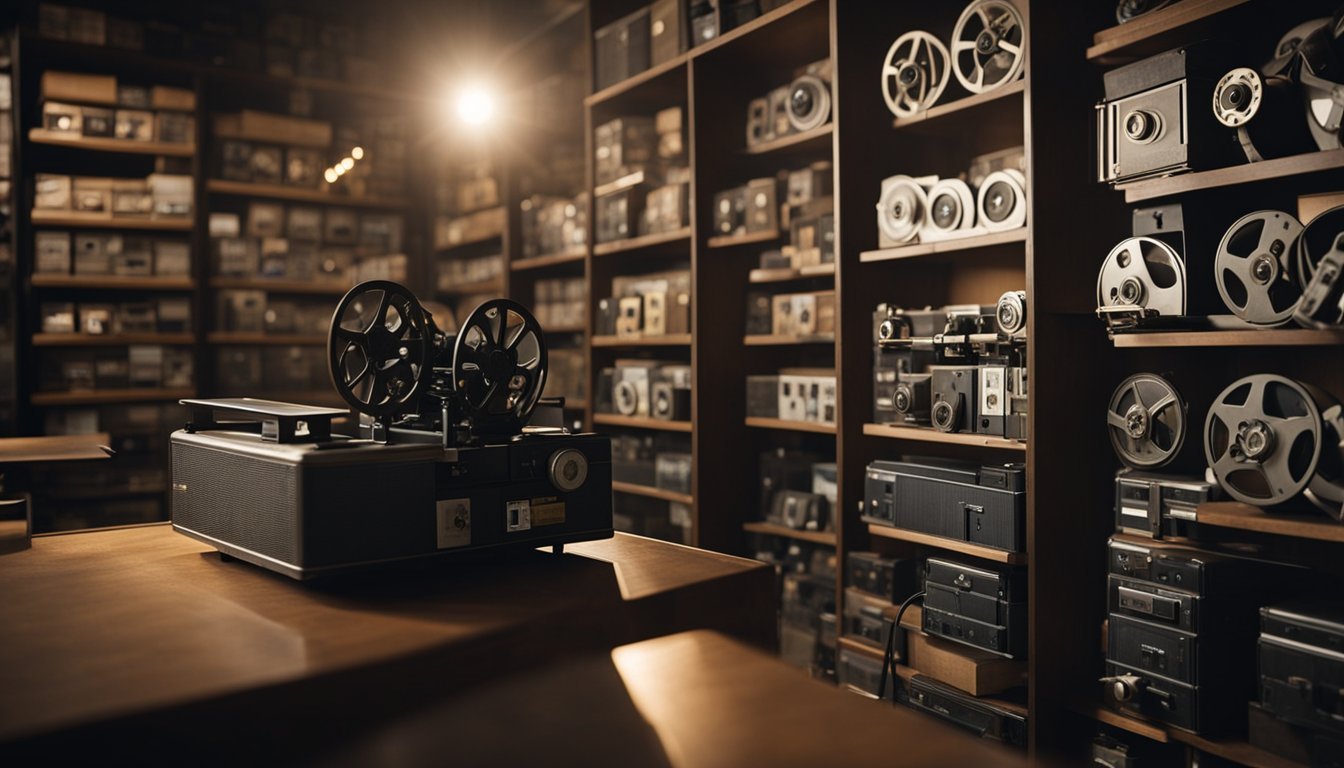Asif Kapadia: Resurrecting Icons Through Archival Footage
A Master of Documentary Storytelling
Asif Kapadia has redefined modern documentary filmmaking by masterfully using archival footage to breathe new life into the stories of iconic figures. His approach has brought unprecedented emotional depth and authenticity to his subjects, whether it's the exhilarating career of Brazilian racecar driver Ayrton Senna, the tragic fall of British singer Amy Winehouse, or the legendary life of Argentinian footballer Diego Maradona.
Kapadia's unique method focuses on constructing narratives through existing footage, creating a powerful, immersive experience for the viewer. This style allows the audience to connect deeply with the subjects, almost as if they are experiencing these moments firsthand. His groundbreaking work in "Senna," "Amy," and "Diego Maradona" exemplifies how archival footage can be transformed into compelling storytelling that resonates on a profound level.
His dedication to authenticity and depth has set a new standard in documentary filmmaking, pushing the boundaries of how historical and personal narratives are told. By meticulously curating and piecing together archival materials, Kapadia offers a raw and unfiltered glimpse into the lives of these extraordinary individuals, ensuring their legacies continue to inspire and captivate audiences worldwide.
Asif Kapadia: A Brief Biography
Asif Kapadia, an acclaimed British filmmaker, is renowned for his documentaries that bring to life the stories of iconic figures in sports and music. His journey from an art school graduate to an award-winning director is marked by key milestones.
Early Life and Education
Asif Kapadia was born in 1972 in London, United Kingdom. Raised in a working-class family, he developed an early interest in storytelling and visual arts.
He pursued his higher education at the Royal College of Art in London. During his time there, he honed his skills in filmmaking, which laid the foundation for his future career. His early works from the college days showcased his unique style and storytelling abilities.
Career Beginnings
Kapadia's career began with short films and experimental projects. His big break came with his debut feature film, The Warrior (2001), which garnered critical acclaim and several awards. The film's success marked Kapadia as a rising talent in the British film industry.
Despite his initial success in feature films, he continued to explore different genres and narratives. His early works often focused on characters living on the margins, facing extraordinary challenges. This approach would later become a signature element in his documentaries.
Rise to Prominence
Kapadia's transition to documentaries brought him international recognition. His documentary Senna (2010) about Brazilian Formula One driver Ayrton Senna received widespread acclaim and numerous awards.
He further cemented his reputation with Amy (2015), the story of singer Amy Winehouse, which won an Academy Award for Best Documentary Feature. Kapadia continued this trajectory with Diego Maradona (2019), rounding out his trilogy on tragic fame with yet another lauded film.
Each of these works highlighted his ability to weave archival footage into compelling narratives, bringing out the human aspects of his subjects' lives. His meticulous approach and distinctive style have made him one of the most respected documentary filmmakers of his generation.
The Art of Storytelling Through Archives
Asif Kapadia's mastery in using archival footage breathes new life into the stories of celebrated figures, providing a unique perspective that contemporary footage could rarely achieve. This method illuminates both the public and private spheres of the personalities he portrays.
Principles of Archival Filmmaking
Kapadia’s approach relies on authenticity and emotional resonance. By using historical footage, he captures the true essence of his subjects during pivotal moments of their lives. This method ensures a more genuine portrayal, which is more impactful than staged recreations.
One principle is the seamless integration of past and present. Kapadia blends archival materials with voiceovers from those who knew the subject, creating a cohesive narrative. This not only preserves the authenticity but also enriches the storytelling.
Challenges of the Genre
Archival filmmaking is fraught with obstacles. Access to footage is often limited by legal and logistical barriers. Directors like Kapadia must navigate licensing issues and negotiate with private collectors or public archives.
Another challenge is the quality of the material. Historical footage may be grainy or damaged, requiring meticulous restoration work. Ensuring the technical quality while maintaining the original essence can be a delicate balance.
Techniques and Narration
Kapadia employs various techniques to enhance his narrative. One effective method is the use of montage sequences, where he compiles clips to evoke emotion and drive the storyline forward.
Voiceover narration from interviews, both vintage and contemporary, adds layers of meaning. This juxtaposition of image and sound enables viewers to connect deeply with the subject.
Furthermore, he avoids dramatization through reenactments, instead relying on genuine footage and candid moments, which grounds the documentaries in reality.
In sum, Kapadia’s pioneering use of archival footage sets him apart in the documentary genre. His meticulous attention to detail and unwavering commitment to authenticity make his films both compelling and deeply human.
Iconic Works: Documenting Legendary Figures
Asif Kapadia has a unique talent for bringing the stories of iconic figures to life through his meticulous use of archival footage. His documentaries such as Amy, Senna, and Diego Maradona reveal the multidimensional lives of his subjects.
Amy Winehouse: 'Amy'
Amy (2015) explores the life of singer Amy Winehouse. The film relies heavily on archival footage, capturing Winehouse's raw talent and troubled personal life. Kapadia's approach provides an intimate and unfiltered look at her rise to fame and subsequent struggles.
The documentary won critical acclaim for its honest portrayal and received the 2016 Oscar for Best Documentary. Through clips and personal testimonies, viewers gain an understanding of Winehouse's complex character and the pressures she faced.
Ayrton Senna: 'Senna'
Senna (2010) chronicles the life and career of Brazilian Formula One driver Ayrton Senna. Utilizing extensive archival footage, the film features stunning race sequences, interviews, and personal moments from Senna's life.
Kapadia focuses on Senna's skill and charisma, as well as the intense rivalries that defined his career. Senna offers a poignant look at his passion for racing and untimely death, providing fans and newcomers alike a deep appreciation of his legacy.
Diego Maradona: 'Diego Maradona'
Diego Maradona (2019) delves into the life of the legendary Argentine footballer. The film includes over 500 hours of archival footage, showcasing his triumphant highs and personal lows. Kapadia highlights Maradona's impact on and off the field, from his early days to his struggles with fame and addiction.
The documentary paints a comprehensive portrait of Maradona, illustrating his significance in the world of football and his connection to his roots in Buenos Aires. The film's candid portrayal offers a balanced view of his athletic genius and human vulnerabilities.
Critical Acclaim and Awards
Asif Kapadia's rise to prominence in the world of documentary filmmaking has been marked by critical acclaim and numerous awards. His groundbreaking work on the documentary Senna in 2010 garnered widespread praise, establishing his unique storytelling technique using archival footage.
Senna won the BAFTA Award for Best Documentary, underscoring Kapadia's ability to captivate audiences with compelling narratives. The documentary also achieved global recognition, winning awards at the Sundance Film Festival and the Los Angeles Film Festival.
In 2015, Kapadia released Amy, a poignant documentary about the late singer Amy Winehouse. Amy received widespread critical acclaim for its sensitive yet raw portrayal of Winehouse's life and career. The film won the Academy Award for Best Documentary Feature, solidifying Kapadia's status as a leading documentarian.
Amy also won the BAFTA Award for Best Documentary and the Grammy Award for Best Music Film. These accolades reflect the film's impact on both the cinematic and music communities.
Kapadia continued his success with Diego Maradona in 2019, a documentary about the legendary footballer. This film received critical acclaim for its in-depth exploration of Maradona's life, combining archival footage with insightful interviews. It was nominated for multiple awards, including the BAFTA Award for Best Documentary.
Kapadia's unique approach to documentary filmmaking has earned him not only critical praise but also a devoted following. His films are celebrated for their authenticity and emotional depth, making him a distinctive voice in the genre.
Film Awards Senna BAFTA Award, Sundance Film Festival Award Amy Academy Award, BAFTA Award, Grammy Award Diego Maradona BAFTA Award (Nominated)
Kapadia’s impressive list of awards and nominations highlights his significant contributions to the field of documentary filmmaking.
Impact on Documentary Filmmaking
Asif Kapadia's distinctive approach to documentary filmmaking has left a significant imprint, redefining industry standards and inspiring emerging filmmakers. His method, focusing on audio interviews and archival footage, brings a unique depth to biographical narratives.
Industry Recognition
Kapadia's work has garnered widespread acclaim. His documentary "Amy" received an Oscar for Best Documentary Feature in 2016. This accolade highlights his ability to craft emotionally resonant and technically adept films.
"Amy" not only achieved critical acclaim but also commercial success, reaching a broad audience. His previous work, "Senna," about the Formula One driver Ayrton Senna, won multiple BAFTA Awards. This film set a new standard for sports documentaries, praised for its innovative editing and storytelling.
Film Award Year Amy Oscar for Best Documentary Feature 2016 Senna BAFTA Awards Multiple
Such recognition underscores Kapadia's role in elevating the documentary genre, proving that documentaries can be both artistically profound and commercially viable.
Influence on Emerging Filmmakers
Kapadia's innovative use of archival footage combined with contemporary audio interviews has influenced a new generation of filmmakers. His approach provides a blueprint for creating compelling narratives without relying on traditional talking-head interviews.
Emerging filmmakers are adopting Kapadia's techniques to breathe life into their subjects and offer fresh perspectives. Films like "Diego Maradona" demonstrate the power of this method, creating an immersive experience that connects deeply with audiences.
The emphasis on storytelling through pre-existing footage encourages filmmakers to explore untapped archives and resources. This method challenges them to construct engaging stories through diligent research and creative editing, pushing the boundaries of documentary filmmaking.
Archival Footage in Modern Cinema
Archival footage has transformed how modern cinema tells stories, offering authenticity and emotional resonance. This section explores technological advancements and the ethical responsibilities filmmakers face when using this material.
Technological Advancements
Recent technological advancements have revolutionized the use of archival footage in filmmaking. Enhanced digital restoration techniques allow old footage to be cleaned up, color-corrected, and presented in high definition. This makes historical and biographical documentaries more visually engaging.
Moreover, AI-powered editing tools streamline the process of sifting through vast amounts of archival material. These tools can identify specific faces, locations, and events, which significantly reduces the time spent on manual searches.
Lastly, virtual reality (VR) integrates archival footage with immersive experiences. For example, VR can recreate historical events using original film footage to provide viewers with an entirely new, interactive way to experience history.
Ethics and Responsibilities
Filmmakers using archival footage bear significant ethical responsibilities. They must ensure accuracy, avoiding the temptation to mislead the audience by taking footage out of context. Transparent sourcing and proper attribution are crucial to maintaining integrity.
Consent is another major consideration. Filmmakers need to obtain permissions when using footage that features identifiable individuals, especially in sensitive or private contexts.
They also have a duty to handle the subject matter with respect and sensitivity. Misrepresentation or exploitation of historical or personal material not only harms reputations but can also perpetuate misinformation.
Incorporating archival footage requires a balance between creative expression and ethical diligence. Ensuring that these standards are upheld maintains the credibility and educational value of the work.





